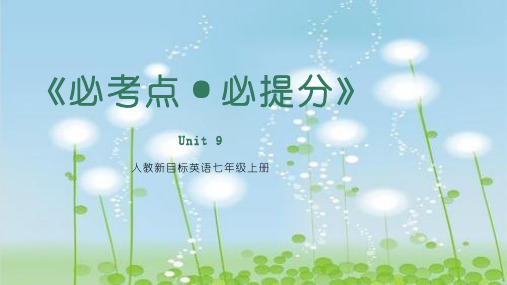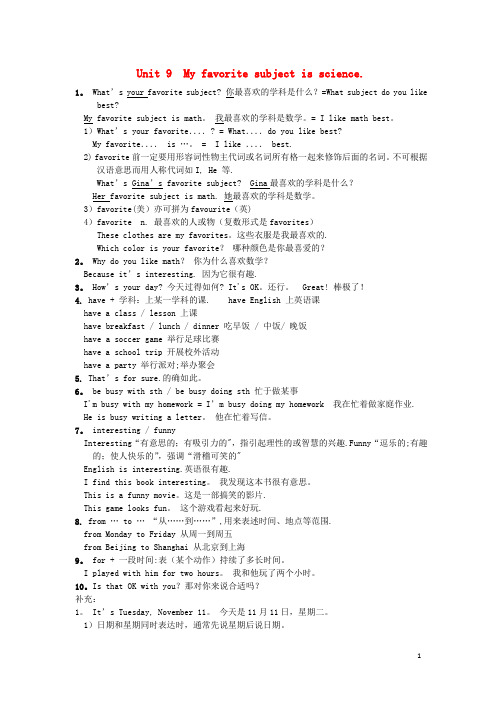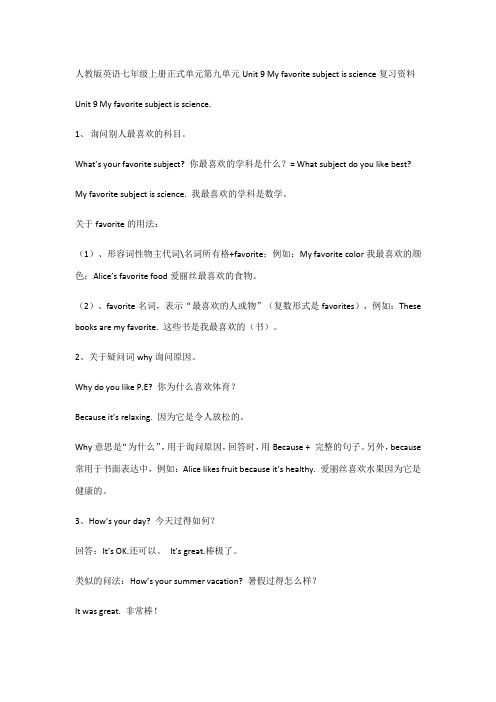七年级英语上册Unit9myfavoritesubjectisscience教案1(新版)人教新目标版
Unit9 My favorite subject is science.七年级上册英语(人教版)

Unit 9 My favorite subject is science. (Period 4)Section B (2a-2c)Ⅰ.完形填空。
Dear Henry,How are you? Do you want to know about my school day?In the morning, we have four classes. At 8:30, we have the first class. It is always math, English or Chinese. My favorite subject is math. ____1____?Because I love ____2____ very much. The second lesson begins at 9:30. ____3____ the class, we have a break (休休). I always play games with my classmates. The next ____4____ classes are from 10:00 to 11:45. And then we have ____5____ in the school dining hall (休休) at 12:00. I like to ____6____ food there. In the afternoon, we always have P.E., art or music. I love these subjects ____7____ they are relaxing. In the ____8____ lesson, I can play sports. How interesting! Our classes ____9____ at 4:00. Then we can go home.My school day is ____10____ but interesting. What about your school day?Yours,Li Xiang1.A.When B.Where C.Why D.What 2.A.pictures B.names C.colors D.numbers 3.A.After B.In C.For D.At 4.A.two B.three C.four D.five 5.A.breakfast B.lunch C.dinner D.sports 6.A.make B.sell C.drink D.eat 7.A.but B.because C.and D.so 8.A.music B.art C.P.E.D.history 9.A.get B.come C.have D.finish 10.A.boring B.free C.busy D.usefulⅡ.按要求完成句子。
Unit 9 My favorite subject is science

重点词组
1.play games with us 2.the next day 3.for sure 4.be busy 5.on Friday 6.have history 7.after that 8.from…to… 9.have an art lesson 10.for two hours
《必考点·必提分》
Unit 9
人教新目标英语七年级上册
目录
重点单词 重点句子
重点词组 重点语法
重点单词
1.favorite adj.&n.(=favourite)特别喜爱的→favorite subject最喜 爱的科目
2.subject n.学科;科目 3.science n.科学→scientist n.科学家→scientific adj.科学的 4.P.E.n.(=physical education)体育→have P.E.上体育课 5.music n.音乐;乐曲→a piece of music一首乐曲→listen to
上班?
重点语法
4)爱问时间的when when是疑问副词,意为“什么时候,何时”,回答when引 导的特殊疑问句,不一定指出具体的时间点,而回答what time引导的问句,则必须说出具体的时间点。
重点句子
2)lesson n. 课;一节课 I can't go with you. I have a lesson at 9:30 this morning. 我不能和你一块去。我今天上午9:30有课。 lesson n. 教训 Can you teach him a lesson? 你能给他一个教训吗?
重点单词
14.free adj.空闲的→(反义词)busy adj.忙碌的;无暇的 →freely adv.自由地;无拘无束地
2020年七年级英语上册Unit9Myfavoritesubjectisscience讲义(新版)人教新目标版

Unit 9 My favorite subject is science. Part 1 Words and Expressionsfavorite /'feɪvərɪt/ adj. & n. (= favourite)特别喜爱的(人或事物) subject /'sʌbdʒɪkt/ n. 学科;科目science /'saɪəns/ n. 科学P.E. /,pi: 'i:/ n. (= physical education) 体育music /'mjuːzɪk/ n. 音乐;乐曲math /mæθ/ n. 数学Chinese /,tʃaɪ'ni:z/ n. 语文;汉语adj. 汉语的;中国的geography /dʒi'ɒgrəfi/n. 地理(学)history/'hɪstri/ n. 历史why /waɪ/ adv. 为什么because /bɪ'kɒz/ conj. 因为Monday /'mʌndeɪ/ n. 星期一Friday /'fraɪdeɪ/ n. 星期五Saturday /'sætə(r)deɪ/ n. 星期六for sure 无疑;肯定free /fri:/ adj. 空闲的cool /ku:l/ adj. 妙极的;酷的Tuesday /'tjuːzdeɪ/ n. 星期二Wednesday /'wenzdeɪ/n. 星期三Thursday/'θɜː(r)zdeɪ/ n. 星期四Sunday /'sʌndeɪ/ n. 星期日A.M. /,eɪ'em/ (=a.m.) 上午P.M. /,pi:'em/ (=p.m.) 下午;午后useful /'juːsfl/ adj. 有用的;有益的from /frɒm/ prep.(表示开始的时间) 从……开始from…to…从……到……Mrs. /'mɪsɪz/ (用于女子的姓氏或姓名前)太太;夫人finish /'fɪnɪʃ/ v. 完成;做好lesson /'lesn/ n. 课;一节课hour /'aʊə(r)/ n.小时1favorite adj. & n. 特别喜爱的(人或事物);最喜爱的(人或事物)1.adj. 修饰名词e.g. favoritecolor/food/fruit/car/subjectW hat’s your favorite subject?2.n. e.g.my/your/his favoriteLucy is always her father’s favorite.because conj. 因为e.g. I like vegetables because they arehealthy. I don’t like geography becauseit is boring.翻译:我喜欢历史因为历史很有意思。
七年级英语上册《Unit-9--My-favorite-subject-is-science》知识点

Unit 9 My favorite subject is science.1。
What’s your favorite subject? 你最喜欢的学科是什么?=What subject do you like best?My favorite subject is math。
我最喜欢的学科是数学。
= I like math best。
1)What’s your favorite....? = What....do you like best?My favorite....is …。
= I like .... best.2) favorite前一定要用形容词性物主代词或名词所有格一起来修饰后面的名词。
不可根据汉语意思而用人称代词如I, He 等.What’s Gina’s favorite subject? Gina最喜欢的学科是什么?Her favorite subject is math. 她最喜欢的学科是数学。
3)favorite(美)亦可拼为favourite(英)4)favorite n. 最喜欢的人或物(复数形式是favorites)These clothes are my favorites。
这些衣服是我最喜欢的.Which color is your favorite?哪种颜色是你最喜爱的?2。
Why do you like math?你为什么喜欢数学?Because it’s interesting. 因为它很有趣.3。
How’s your day? 今天过得如何? It's OK。
还行。
Great! 棒极了!4. have + 学科:上某一学科的课. have English 上英语课have a class / lesson 上课have breakfast / lunch / dinner 吃早饭 / 中饭/ 晚饭have a soccer game 举行足球比赛have a school trip 开展校外活动have a party 举行派对;举办聚会5. That’s for sure.的确如此。
人教版-英语-七上-9单元Myfavoritesubject课文注释

人教版-英语-七上-9单元Myfavoritesubject课文注释Unit 9 My favorite subject is science.1. How's your day?答案今天过得如何?How's your day?是非正式场合朋友见面时的问候用语2. A: How's your day?B:Great. Today's my day!答案A:今天可好?B:棒极了!今天太爽了!3. I like Monday because I have P.E.and history.答案我喜欢星期一,因为我上体育课和历史课。
此处have与学科名称搭配,表示“上某一学科的课”。
4. We have P.E. on Tuesday and Thursday.答案我们周二和周四上体育课。
5. have a class/lesson答案上课6. have breakfast/lunch/dinner答案吃早/中/晚饭7. have a soccer game答案举行足球比赛8. have a school trip答案开展校外活动9. have a party答案举行派对;举办聚会10. Because the next day is Saturday!答案因为第二天是星期六!the next day表示“接下来的那一天;紧接着的那一天”,相当于汉语中的“第二天”。
11. We had a bad time that day, but the next day's trip was pretty good.答案那天我们玩得一点都不开心,但第二天的旅行却很好。
12. That's for sure.答案的确如此。
(那可一点不假。
)That's for sure.表示完全赞同他人的观点,相当于汉语中的“那是肯定的”、“确实是这样的”或“完全没有问题”。
Unit 9 My favorite subject is science 知识点归纳-【知识清单单

人教版新目标七上英语单元知识点归纳Unit9 My favorite subject is science.重点词汇favorite/'feivərit/ adj.&n.特别喜爱的(人或事物)subject/'sʌbdʒekt/ n. 学科;科目science/'saiəns/ n. 科学math/mæθ/ n. 数学Chinese/tʃai'ni:z/ n. 语文;汉语中国的geography/dʒi'ɔgrəfi/ n. 地理(学)history/'histri/ n. 历史Monday/'mʌndei/ n. 星期一Friday/'fraidei/ n. 星期五Saturday/'sætədei/ n. 星期六free/fri:/ adj. 空闲的cool/ku:l/ adj. 妙极的;酷的Tuesday/'tju:zdei/ n. 星期二Wednesday/'wenzdei/ n. 星期三Thursday/'θəzdei/ n. 星期四Sunday/'sʌndei/ n. 星期日useful/'ju:sfl/ adj. 有用的;有益的finish/'finiʃ/ v. 完成;做好lesson/'lesn/ n. 课;一节课重点短语:my favorite subject 我最喜欢的科目like…best 最喜欢…have class (have lessons) 上课have no (don’t have) classes/lessons 没有课watch TV 看电视do one’s homework 做某人的家庭作业on (at) weekends 在周末play soccer 踢足球do badly/ poorly in sth. 在某方面做不好/糟more than超过,多于less than少于have more多于,有更多as…as像……一样as (so) far as 就……而言would rather宁愿,更喜欢neither…nor 既不……也不between…and 在……和……之间see the doctor 看病,就诊spend some time doing sth花费一些时间做某事必背典句:1. ---What’s your favorite subject? 你最喜欢的科目是什么?---My favorite subject is science. 我最喜欢的科目是科学。
Unit9Myfavoritesubjectisscience单元语法知识和重要句子人教版七年级英语

人教版英语七年级上册正式单元第九单元Unit 9 My favorite subject is science复习资料Unit 9 My favorite subject is science.1、询问别人最喜欢的科目。
What’s your favorite subject? 你最喜欢的学科是什么?= What subject do you like best? My favorite subject is science. 我最喜欢的学科是数学。
关于favorite的用法:(1)、形容词性物主代词\名词所有格+favorite;例如:My favorite color我最喜欢的颜色;Alice’s favorite food爱丽丝最喜欢的食物。
(2)、favorite名词,表示“最喜欢的人或物”(复数形式是favorites),例如:These books are my favorite. 这些书是我最喜欢的(书)。
2、关于疑问词why询问原因。
Why do you like P.E? 你为什么喜欢体育?Because it’s relaxing. 因为它是令人放松的。
Why意思是“为什么”,用于询问原因,回答时,用Because + 完整的句子。
另外,because 常用于书面表达中,例如:Alice likes fruit because it’s healthy. 爱丽丝喜欢水果因为它是健康的。
3、How’s your day?今天过得如何?回答:It’s OK.还可以。
It’s great.棒极了。
类似的问法:How’s your summer vacation? 暑假过得怎么样?It was great. 非常棒!4、I like Monday because I have P.E and history.我喜欢星期一因为我上历史课和体育课。
have + 课程名词,表示“上…课”;have在不同的语境中有不同的意思,例如:I have a sister. (有)我有一个妹妹。
Unit9 My favorite subject is science.七年级上册英语(人教版)

Unit 9 My favorite subject is science. (Period 6)单元复习课Ⅰ.按要求完成下列句子。
1.My favorite subject is science.(对画线部分提问)________ ________ your favorite subject?2.He is really busy today.(改为一般疑问句)________ ________ really busy today?3.I like P.E. best.(改为同义句)________ ________ subject is P.E.4.He likes art because it’s fun.(对画线部分提问)________ does ________ like art?5.My science teacher is Mr. Green.(对画线部分提问)________ ________ your science teacher?Ⅰ.从方框中选出合适的选项还原到短文中,有一个多余选项。
I’m Jim. Today is Wednesday, and I’m really busy. At 7:30 a.m., ____6____ Then I go to school. Classes start at 8:00 a.m. ____7____ It’s easy and fun. At 8:55 a.m., I have math. My teacher says it’s useful, but I think it’s boring. Next, I have history at 10:00 a.m. ____8____ Then I have science. ____9____ He is very kind (和蔼的). Lunch is from 12:00 to 1:30 p.m. ____10____ They are art and music. Classes finish at 4:30 p.m. After school, I often play basketball with my classmates.6.__________ 7.__________ 8.__________ 9.__________ 10.__________Ⅰ.任务型阅读。
- 1、下载文档前请自行甄别文档内容的完整性,平台不提供额外的编辑、内容补充、找答案等附加服务。
- 2、"仅部分预览"的文档,不可在线预览部分如存在完整性等问题,可反馈申请退款(可完整预览的文档不适用该条件!)。
- 3、如文档侵犯您的权益,请联系客服反馈,我们会尽快为您处理(人工客服工作时间:9:00-18:30)。
Unit 9 My favorite subject is science.Part 1: Teaching design (第一部分:教学设计)SECTION AGoals●To teach the students what questions, why questions●To let the students talk about their favorite subjectsProceduresWarming up by learning about wh-questionsWhat is a wh-question?DefinitionA wh-question is a question that contains an interrogative pro-form.Also known as: Content question, question word question, information question Examples (English)Here are some examples of words that begin wh-questions in English. Most of them begin with wh-: who ; what ; when ; where ; why ; howWarming up by discussingT: Good mo rning, everyone! We’re going to have our English class. You have many subjects everyday. Subject is the lesson you learn everyday, such as English, math, Chinese and so on. Maybe you think some of them are interesting and so you are good at them. But some are not. Right?S: Yes…T: Now let’s see how many subjects we have everyday.S: Math, English, Chinese, art, music, biology, P.E.…T: And we have science. Science includes chemistry, physics and biology and so on.1a Matching the words with the picturesLook at the picture on page 71, there are many subjects in the picture. Please match the words with picture.1b Listening and circling the subjects in 1a you hearWe have m any different subjects everyday. Now let’s listen to the tape and circle the subjects in 1a you hear.Read the tapescript to underline the wh-question.1c.Doing pairworkI think you must have your favorite subjects. Please practice the conversation below. First read after me and practice it with your partner. I will ask some pair to act it out.Then make your own conversations with your partner like this:2a Listening and putting in orderListen to the tape and please put the conversation in order. First you just listen and then put them in order.Can you try to place the sentences in right order?The right order should be like this:2b Listening and matchingYou will hear the conversation. In the conversation, people talk about school subjects. Listen and matching the subjects you hear with the description words.We can only match two items according to the tapescript.2cThinking and matchingNow what do you think of your subjects? You can give your opinion. You can practice this conversation first.Then you can make up your conversation with your partners and match the subjects with the description words.The answers may be like this:2d Doing pairworkOK, stop! Now please make a conversation using the information in 2c.3a Completing the conversationLook at your book on page 73. Two students are talking about their subjects andteachers.Please fill in the blanks with the words in the box.3b Doing pairworkThis time you can ask your partner about his or her favorite subject and the teacher. Complete the chart.You can practice the dialogue like this:4 SurveyingOK! We know a lot about our classmates and partners. But how well do you know your parents? Complete the chart with your parents’ favorite things then talk about your classmates. You can talk about it like this:Students’ answers may like this:Closing down by writing a short passageJust now we talk about your parents. Now please write a short passage about your parents’ hobby.SECTION BGoals●To go on talking about favorite subjects●To learn the days of week and the expressions of datesProceduresWarming up by talking about the dateT: Boys and girls! Today we’re going to learn a new part Section B. By the way, what day is it today?S: It’s Tuesday.T: What’s the date today?S: It’s October 9.T: Oh! I see. Let’s open you book and turn to Page74, and learn 1a.1a Putting in orderLook at your book and put the days into correct order. The correct order should be:1b Checking the subjectsWhat subject do you study at school? Check the subjects. You should pronounce them correctly and remember these words.1c Doing pairworkLook at this teaching syllabus.Ask and answer questions about the subjects you study at school. For example:Students’ dialogue may be like this:2a Listening and writingLet’s do a listening exe rcise. Listen and write the school subjects you hear. First you just listen and then you can write.The answers are like these. You can check them.2b Listening and completingListen again and complete the chart.When you hear, you should pay attention to the names and the subjects. Do not confuse them with each other.Read the words of the recording to underline the expressions.2c Doing pairworkMake conversations using the information in the chart. First please read the conversation in the book. Try to read it correctly and fluently.Then make up the similar conversation with your partners.3a Reading and circlingLet’s read the following letter. Underline the things Lin Mei likes. Circle the things she doesn’t like. While reading you shou ld pay attention to the pronunciations and intonation and underline the expressions.These are the answers.3b Completing scheduleWe have read Lin Mei’s letter in 3a. H ere is Lin Mei’s schedule. Please complete it with the information from 3a. Then we have a clear look about what she does on that day.According to the letter we can find this information.Answers3c Writing your scheduleI know you all have busy days. What is your favorite school day? Write your schedule for that day.4 Asking about favorite daysPlease work in groups of four. Ask your partners about their favorite days. Later you will tell the class what you learned.These are some of the students’ reports.Another example:Closing down by playing a guessing gameL et’s play a guessing game. We can play it like this: One student does some actions about one of subjects. And the others guess what subject it is. Let’s see who can guess the most subjects.SELF CHECK1 Checking the new words you knowThese are the words in this unit. I’d like you check the words you know and circle any words that you don’t know.2 Adding five new words to your Vocab-BuilderWork in groups. This activity helps build vocabulary by providing a specific time and place for you to record the new words. Please share your list with other students.3 Writing a responseRead Zhao Jie’s no tebook. See whether you can find some problems and then write him a response. Tell Zhao Jie about what subjects you like and why.The students’ response may be like this:Closing down by making a lectureI think everyone has a favorite subject and has his reasons too. Let’s talk about “my favorite subject”. You have five minutes to prepare. Then stand up to give your lecture to us. You can use body language when needed.Just for fun!Let’s learn some names of English songs.Honkey Pokey; How Is The Weather?(天气怎么样?); I Love Little Pussy(我喜欢小猫); I’M A Little Teapot(我是一把小茶壶); If You're Happy(如果你感到快乐); Jimmy Crack Corn(撬开裂纹玉米); Jingle Bells(铃儿响叮当<1>); Jingle Bells(铃儿响叮当 <2>); Lazy Mary(懒惰的玛丽); Let Everyone Clap Hands(让每一个人拍手); Let Us Sing Together(让我们一起唱歌); Little Cabin In The Wood (森林中的小木屋); Little Goldfish(小金鱼); Little Green Frog(绿色的小青蛙); Little Peter Rabbit(小兔彼得); Make New Friends(结识新朋友); My Aunt Came Back(我的姑妈回来了); My Brother And I(我的哥哥和我); Oh, Christmas Tree (哦,圣诞树); Oh, Susanna(噢,苏珊娜);Pat A Cake(做个面包); Pop!Goes The Weasel(砰!追逐鼹鼠!); Rain, Rain, Go Away(雨,雨,走开); Reuben Reuben(鲁宾); Roll That Bal(滚动那个球); Round The Clock(围着时钟转); Sally, Go' Round The Sun(萨利绕着太阳转); Sea Shells(海洋贝壳); She'll Be Comin' Round The Mountain(她将绕过这座山脉过来); Simple Simon(头脑简单的西蒙); Sing Together(一起歌唱); Six Little Ducks(六只小鸭子); Smile(微笑); Ten Fat Sausages (十根肥香肠); The Ants Go Marching(蚂蚁在行军); The Bear Went Over The Mountain (小熊上了山); The Family(家庭); The Farmer In The Dell(农夫在小山谷中); The Finger Family(手指家庭); The Months(月份); The More We Get Together(我们在一起越多)Part 2: Teaching Resources (第二部分:教学资源)I. Background readings—— Time (美国人的时间观)What is time? Is it a thing to be saved or spent or wasted, like money? Or is it something we have no control over, like the weather? Is time the same all over the world? That's an easy question, you say. Wherever you go, a minute is 60 seconds, an hour is 60 minutes, a day is 24 hours, and so forth. Well, maybe. But in America, time is more than that. Americans see time as a valuable resource. Maybe that's why they are fond of the expression, "Time is money."Because Americans believe time is a limited resource, they try to conserve and manage it. People in the U.S. often attend seminars or read books on time management. It seems they all want to organize their time better. Professionals carry around pocket planners-some in electronic form-to keep track of appointments and deadlines. People do all they can to squeeze more life out of their time. The early American hero Benjamin Franklin expressed this view best: "Do you love life? Then do not waste time, for that is the stuff life is made of."To Americans, punctuality is a way of showing respect for other people's time. Being more than 10 minutes late to an appointment usually calls for an apology, and maybe an explanation. People who are running late often call ahead to let others know of the delay. Of course, the less formal the situation, the less important it is to be exactly on time. At informal get-togethers, for example, people often arrive as much as 30 minutes past the appointed time. But they usuallydon't try that at work.II. Fun materials ——Holes and coversOnce San Diego was badly flooded. Some residents suggested removing manhole covers to speed up the draining of rain flooded streets. That sounded a good idea. However, it made matters worse because the underground system was flooded too. Several covers became lost in knee-deep water, and police were called in to help. “we’re picked up the lost covers all right.” One officer asked headquarters. “Now how do we find the holes?”Back came the order: “That’s easy. Walk till you fall in.”III Word studies1.strict(stricter, strictest)a. 1. 严格的;严谨的精确的;正确的 exact; accurate: The men who make the parts of an airplane must use strict measurements. 制造飞机零件的工人必须使用精确的量具。
